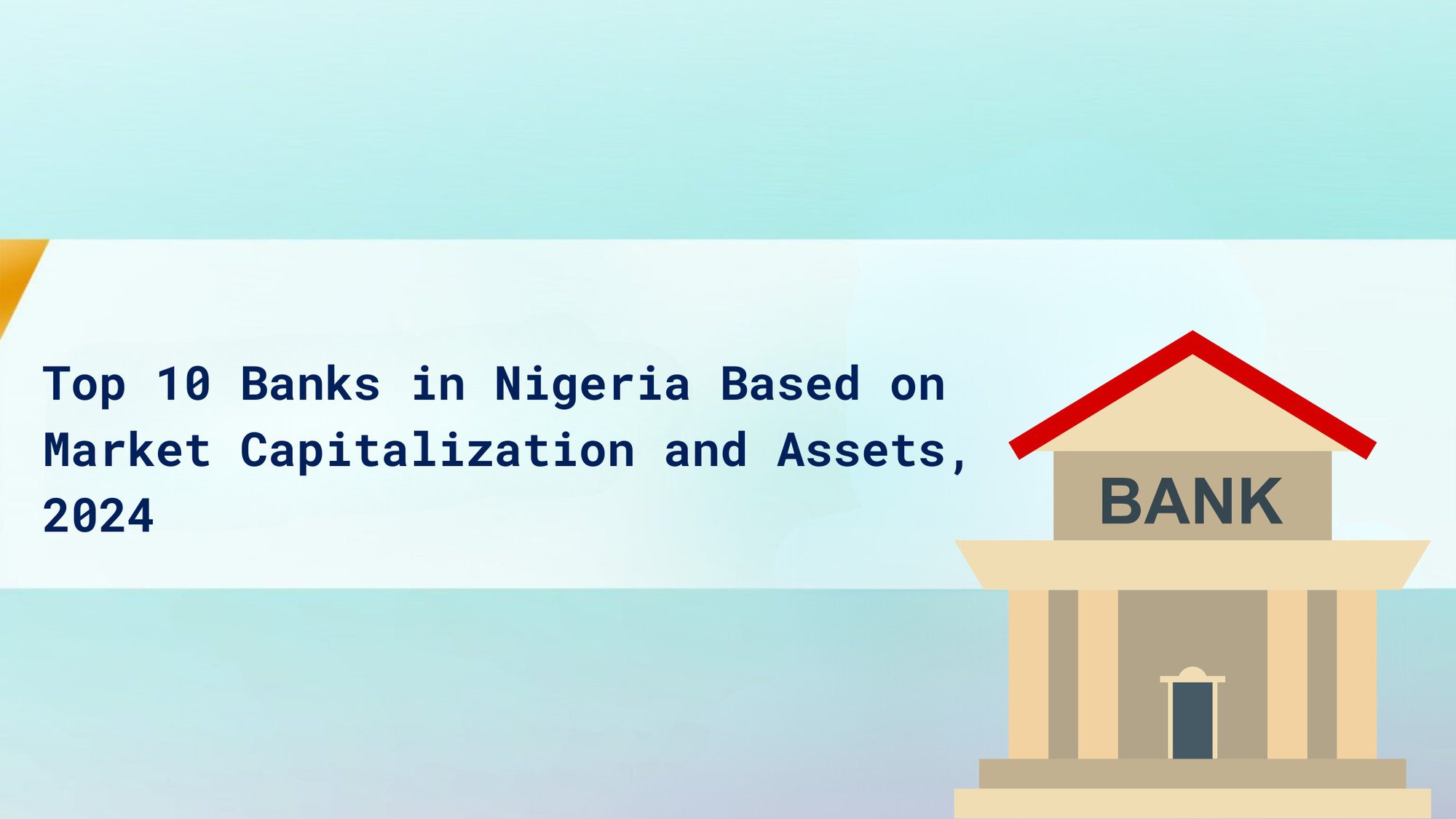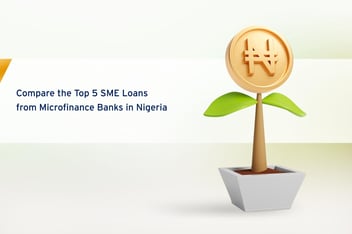
Top Banks in Nigeria Based on Market Capitalization and Assets, 2024
Author Taiwo Temitope-Adesope
Nigeria is the largest economy in Africa, with a population of over 200 million people. The country's financial services industry is dominated by banks, which play a critical role in the country's economic growth. As of 2024, the top 10 banks in Nigeria based on market capitalization and assets are a mix of local and international banks.
The Central Bank of Nigeria (CBN) regulates the banking industry in Nigeria and has implemented policies to promote financial stability and growth. The Nigerian banking industry has seen significant growth in recent years, with many banks expanding their operations and increasing their asset base. As of 2024, the total assets of Nigerian banks have surpassed N70 trillion, with market capitalization reaching over N5 trillion.
In this article, we will take a closer look at the top 10 banks in Nigeria based on market capitalization and assets, as of 2024. We will explore the factors that have contributed to their success and the challenges they face in a rapidly evolving industry. By examining the performance of these banks, we can gain insights into the current state of the Nigerian banking industry and its potential for future growth.
Overview of Nigeria's Banking Sector
Nigeria's banking sector is one of the most vibrant in Africa, with a high degree of competition among banks. The Central Bank of Nigeria (CBN) is the regulatory body responsible for supervising and regulating the banking sector. As of 2024, 22 commercial banks are operating in the country.
The banking sector in Nigeria has continued to grow in recent years, with total assets of the top 10 banks in the country amounting to over $100 billion. The top banks in Nigeria are dominated by Tier 1 banks, which are banks with the highest level of capitalization and asset base.
According to recent data, the top 5 banks in Nigeria by market capitalization and total assets are Access Bank, Zenith Bank, Guaranty Trust Bank, United Bank for Africa, and First Bank of Nigeria. These banks are also among the largest banks in Africa.
The Nigerian banking sector is a major player in the West African sub-region, with some of the largest African banks headquartered in the country. The sector is dominated by Anglophone West African countries, with Nigeria being the largest economy in the region.
Overall, the Nigerian banking sector has shown resilience in the face of various challenges, including economic downturns and regulatory changes. The sector is expected to continue to grow in the coming years, driven by technological advancements and an increasing focus on financial inclusion.

Top 10 Banks in Nigeria Based on Market Capitalization and Assets
Nigeria's banking sector has experienced significant growth in recent years, with the emergence of new banks and mergers, and acquisitions. The following is a list of the top 10 banks in Nigeria based on market capitalization and assets as of February 16, 2024.
Access Bank
Access Bank is currently the largest bank in Nigeria by market capitalization and assets. As of 2024, its market capitalization is estimated to be around NGN 2.7 trillion, while its total assets are estimated to be around NGN 33.4 billion. Access Bank is a subsidiary of Access Holdings, which is owned by Access Holdings Plc.
Zenith Bank
Zenith Bank is the second-largest bank in Nigeria by market capitalization and assets. As of 2024, its market capitalization is estimated to be around NGN 2.5 trillion, while its total assets are estimated to be around NGN 29.5 billion. Zenith Bank is publicly traded on the Nigerian Stock Exchange (NSE) and is owned by Zenith Bank Plc.
United Bank for Africa (UBA)
United Bank for Africa (UBA) is the third-largest bank in Nigeria by market capitalization and assets. As of 2024, its market capitalization is estimated to be around NGN 2.2 trillion, while its total assets are estimated to be around NGN 26.1 billion. UBA is publicly traded on the NSE and is owned by United Bank for Africa Plc.
Guaranty Trust Bank (GTB)
Guaranty Trust Bank (GTB) is the fourth-largest bank in Nigeria by market capitalization and assets. As of 2024, its market capitalization is estimated to be around NGN 1.8 trillion, while its total assets are estimated to be around NGN 21.4 billion. GTB is publicly traded on the NSE and is owned by Guaranty Trust Holding Company Plc.
First Bank of Nigeria (FBN)
First Bank of Nigeria (FBN) is the fifth-largest bank in Nigeria by market capitalization and assets. As of 2024, its market capitalization is estimated to be around NGN 1.6 trillion, while its total assets are estimated to be around NGN 19.2 billion. FBN is publicly traded on the NSE and is owned by FBN Holdings Plc.
Ecobank Nigeria
Ecobank Nigeria is the sixth-largest bank in Nigeria by market capitalization and assets. As of 2024, its market capitalization is estimated to be around NGN 1.4 trillion, while its total assets are estimated to be around NGN 16.7 billion. Ecobank Nigeria is a subsidiary of Ecobank Transnational.
Fidelity Bank
Fidelity Bank is the seventh-largest bank in Nigeria by market capitalization and assets. As of 2024, its market capitalization is estimated to be around NGN 1.2 trillion, while its total assets are estimated to be around NGN 14.4 billion. Fidelity Bank is publicly traded on the NSE and is owned by Fidelity Bank Plc.
Union Bank of Nigeria (UBN)
Union Bank of Nigeria (UBN) is the eighth-largest bank in Nigeria by market capitalization and assets. As of 2024, its market capitalization is estimated to be around NGN 1.1 trillion, while its total assets are estimated to be around NGN 13.5 billion. UBN is publicly traded on the NSE and is owned by Union Bank of Nigeria.
First City Monument Bank (FCMB)
First City Monument Bank (FCMB) is the ninth-largest bank in Nigeria by market capitalization and assets. As of 2024, its market capitalization is estimated to be around NGN 1 trillion, while its total assets are estimated to be around NGN 12.2 billion. FCMB is publicly traded on the NSE and is owned by FCMB Group Plc.
Stanbic IBTC Bank
Stanbic IBTC Bank is the tenth-largest bank in Nigeria by market capitalization and assets. As of 2024, its market capitalization is estimated to be around NGN 937 billion, while its total assets are estimated to be around NGN 11.2 billion. Stanbic IBTC Bank is a subsidiary of Stanbic IBTC Holdings, which is owned by Standard Bank Group.
Sterling Bank
Sterling Bank is the eleventh-largest bank in Nigeria by market capitalization and assets. As of 2024, its market capitalization is estimated to be around NGN 821 billion, while its total assets are estimated to be around NGN 9.8 billion. Sterling Bank is publicly traded on
Conclusion
In conclusion, the Nigerian banking industry has continued to grow in recent years, with the top 10 banks in Nigeria based on market capitalization and assets as of 2024 leading the charge. Nigerian banks have been able to weather the storm of economic uncertainty and regulatory challenges, thanks to their strong balance sheets, strategic partnerships, and innovative products and services.
The top banks in Nigeria have also been able to expand their reach beyond the country's borders, with some of them establishing a presence in other African countries such as Kenya, Ghana, South Africa, and Zambia. These international expansions have helped to diversify their revenue streams and mitigate risks associated with operating in a single market.
Furthermore, the Nigerian banking industry has attracted significant interest from foreign investors, particularly those from the United Kingdom. This has resulted in increased investment in the industry, as well as greater collaboration between Nigerian and UK-based banks.
In terms of specific areas of the banking industry, investment banking, pension management, and asset management have continued to be significant growth areas in Nigeria. The top banks in Nigeria have been able to leverage their expertise in these areas to provide innovative solutions to clients and generate significant revenue.
Overall, the top 10 banks in Nigeria based on market capitalization and assets as of 2024 are well-positioned to continue their growth trajectory in the coming years. With a strong regulatory framework and supportive government policies, the Nigerian banking industry is poised to remain a key driver of economic growth and development in the country and beyond.
About Author

Taiwo Temitope-Adesope
Taiwo is a passionate storyteller and strategist dedicated to empowering women and crafting compelling narratives. A First-Class graduate in Mass Communication from Covenant University, she specializes in writing, public relations, and digital marketing. As a Content Manager at Suretree, she drove a 50% increase in web traffic through SEO and boosted website engagement by 60% in just four months. Her leadership experience includes serving as Public Relations Officer for the Covenant University Student Council and contributing to impactful volunteer initiatives. With expertise in strategic thinking and business acumen, Taiwo continues to create stories that inspire confidence and imagination.
.png?width=1615&height=444&name=nairaCompare%20Christmas%20logo%20(PNG).png)








